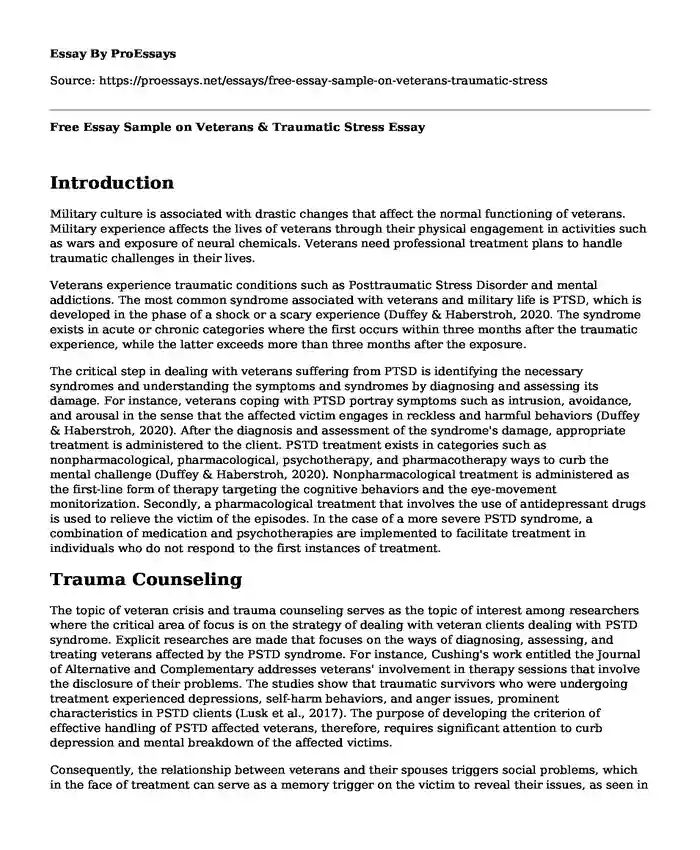Introduction
Military culture is associated with drastic changes that affect the normal functioning of veterans. Military experience affects the lives of veterans through their physical engagement in activities such as wars and exposure of neural chemicals. Veterans need professional treatment plans to handle traumatic challenges in their lives.
Veterans experience traumatic conditions such as Posttraumatic Stress Disorder and mental addictions. The most common syndrome associated with veterans and military life is PTSD, which is developed in the phase of a shock or a scary experience (Duffey & Haberstroh, 2020. The syndrome exists in acute or chronic categories where the first occurs within three months after the traumatic experience, while the latter exceeds more than three months after the exposure.
The critical step in dealing with veterans suffering from PTSD is identifying the necessary syndromes and understanding the symptoms and syndromes by diagnosing and assessing its damage. For instance, veterans coping with PTSD portray symptoms such as intrusion, avoidance, and arousal in the sense that the affected victim engages in reckless and harmful behaviors (Duffey & Haberstroh, 2020). After the diagnosis and assessment of the syndrome's damage, appropriate treatment is administered to the client. PSTD treatment exists in categories such as nonpharmacological, pharmacological, psychotherapy, and pharmacotherapy ways to curb the mental challenge (Duffey & Haberstroh, 2020). Nonpharmacological treatment is administered as the first-line form of therapy targeting the cognitive behaviors and the eye-movement monitorization. Secondly, a pharmacological treatment that involves the use of antidepressant drugs is used to relieve the victim of the episodes. In the case of a more severe PSTD syndrome, a combination of medication and psychotherapies are implemented to facilitate treatment in individuals who do not respond to the first instances of treatment.
Trauma Counseling
The topic of veteran crisis and trauma counseling serves as the topic of interest among researchers where the critical area of focus is on the strategy of dealing with veteran clients dealing with PSTD syndrome. Explicit researches are made that focuses on the ways of diagnosing, assessing, and treating veterans affected by the PSTD syndrome. For instance, Cushing's work entitled the Journal of Alternative and Complementary addresses veterans' involvement in therapy sessions that involve the disclosure of their problems. The studies show that traumatic survivors who were undergoing treatment experienced depressions, self-harm behaviors, and anger issues, prominent characteristics in PSTD clients (Lusk et al., 2017). The purpose of developing the criterion of effective handling of PSTD affected veterans, therefore, requires significant attention to curb depression and mental breakdown of the affected victims.
Consequently, the relationship between veterans and their spouses triggers social problems, which in the face of treatment can serve as a memory trigger on the victim to reveal their issues, as seen in the study of Cushing (2002). The course emphasizes identifying the syndrome through the engagement with the veteran clients who are later assessed to ascertain their stage of the syndrome through therapeutic sessions.
Conclusion
The individuals' subjection then follows the diagnosis and assessment stage into a treatment program by administering psychotherapy, medication, and pharmacological treatments. However, his work is generated through the assumption of factors that the veterans are not subjected to, which presents falsified information and treatment programs. Veterans experiencing PSTD are bound to go through a diagnosis and assessment stage to acquire the most befitting treatment plan.
References
Duffey, T., & Haberstroh, S. (Eds.). (2020). Introduction to Crisis and Trauma Counseling. John Wiley & Sons.
Lusk, J. D., Sadeh, N., Wolf, E. J., & Miller, M. W. (2017). Reckless selfdestructive behavior and PTSD in veterans: The mediating role of new adverse events. Journal of traumatic stress, 30(3), 270-278.
Cite this page
Free Essay Sample on Veterans & Traumatic Stress. (2023, Nov 25). Retrieved from https://proessays.net/essays/free-essay-sample-on-veterans-traumatic-stress
If you are the original author of this essay and no longer wish to have it published on the ProEssays website, please click below to request its removal:
- Diverse Personalities Essay
- Reflection on TED Talk by Vern Myers Essay
- America's Pursuit of Happiness Essay
- Research Paper on What is Cushing's Syndrome?
- Essay Example on Martin Okabi: A Young African's Inspiring Story of Overcoming Adversity
- Essay Example on Enhancing Skills & Productivity Through Training & Learning
- US Vets: Causes, Symptoms & Treatment of PTSD - Research Paper







